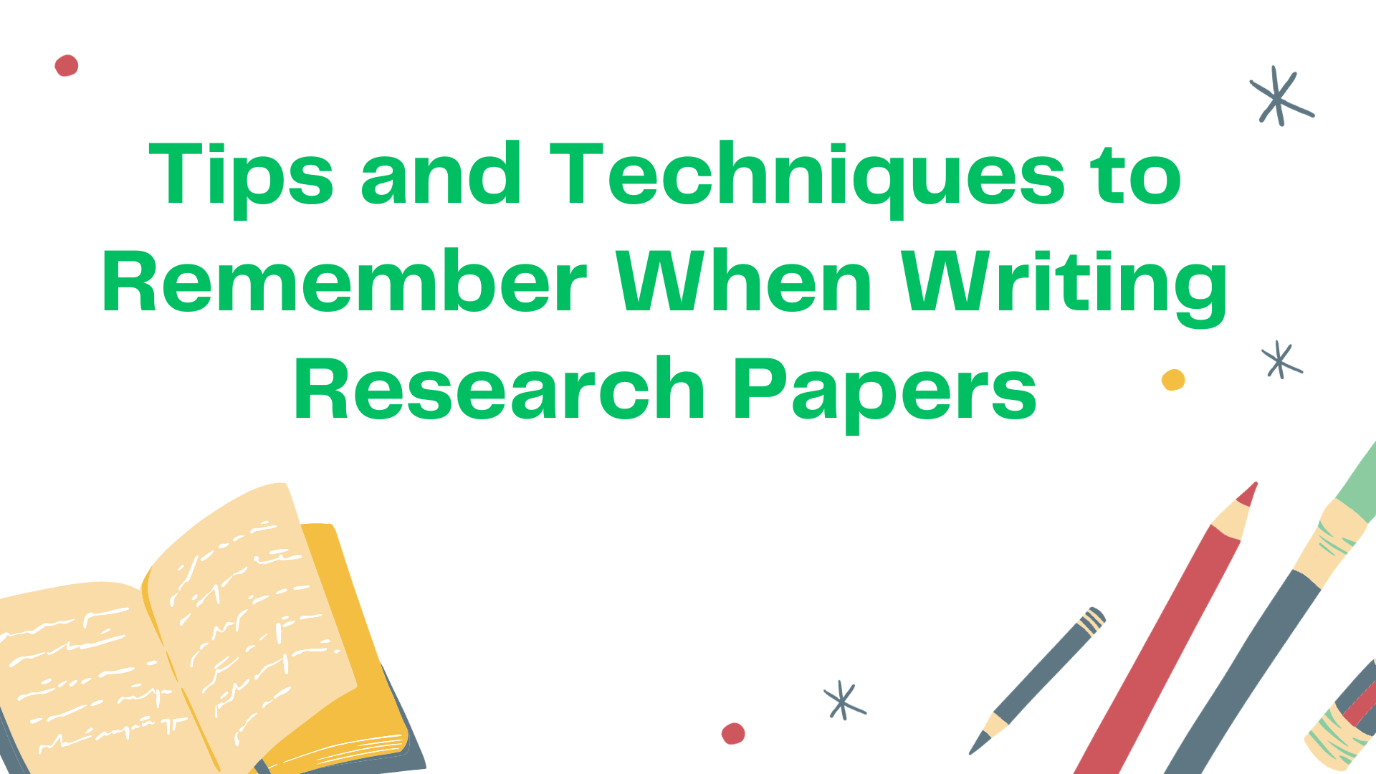Tips and Techniques to Remember When Writing Research Papers

Writing good research papers is not a walk in the park. It requires skill and effort – the former of which you have to inculcate and the latter of which you have to strive to make.
Elevate Your Writing with Our Free Writing Tools!
Did you know that we provide a free essay and speech generator, plagiarism checker, summarizer, paraphraser, and other writing tools for free?
Access Free Writing ToolsIf you follow the right techniques when writing research papers, you will be able to make them authoritative, high-quality, original, and effective. If you are looking to get your research papers to fit in that category, you’re at the right place.
In this post, we’re going to look at some tips and techniques that you should follow when writing research papers.
1. Choose an Engaging and Compelling Topic
Many times, the topic for your research paper may be provided to you by your instructor or by your institute, etc., if you happen to be a student.
But, if you have a choice in the matter, you need to be very careful about the topic that you pick. The topic that you decide for your research paper should have the following properties:
- It should be something that the intended readers genuinely have a need of (or interest in) reading. It should be, so to speak, something relevant and contemporary and actually helpful and valuable in the information that it provides.
- It should be something that you have basic knowledge about. While you can always research the specifics and the more complex parts of the topic, you should have a basic idea of what the topic is, what it relates to, what it generally comprises, and so on.
- It should be something that you can write on extensively. Research papers are usually detailed and lengthy – and all the facets they contain have to be valuable and information-rich. You can only make your content like that if the topic you choose is comprehensive and extensive enough to be deeply elaborated.
2. Do your Research Properly from Reliable Sources
That’s two things that we’ve mentioned in our heading. You have to a) do your research properly (we’ll elaborate, don’t worry) and b) do it from reliable sources.
- Doing research properly
Doing your research properly basically refers to correctly utilizing the material that you get from your sources. One type of “research” can involve simply scanning the content and material published on a source and then reproducing a closely resembling version of it without bringing any of your own work in there.
Not only does this type of research produce unoriginal and unappealing content, but it also puts you in danger of committing plagiarism unknowingly.
When you utilize the content from a source (and not the idea/information), you can end up committing accidental plagiarism. Of course, we mean that even if you change the content in your own words. Direct copying would mean direct plagiarism, which is worse.
To make your research proper, you have to focus on taking concepts and information from a source and doing so from multiple sources. That way, you can avoid getting your writing influenced by a particular source and committing plagiarism.
- Doing research from reliable sources
This one is fairly straightforward.
When doing your research, you should ensure that the sources you use are acclaimed and known to be reliable. The sources from where you take your information have to be reliable if you want your research paper to be reliable.
There are quite a few places that you can visit to find reliable research material, such as:
- ResearchGate
- JSTOR
- Google Scholar
If you do all of this, you will be able to make your research paper authoritative and credible.
3. Write with Readability in Mind
Another thing that you have to do to make your research paper come out effective and high-quality is to maintain readability in your diction. Apart from where you’re compelled – such as when you have to talk about complex and complicated terms and concepts – the wording used in your research paper should be simple and clear.
Doing that involves doing a couple of different things, such as:
- Making sure your sentences are short and easy to understand. As a standard, 20 words is the limit for readable sentences.
- Making sure that your words are simple. Rare words and terms can be occasionally sprinkled through the content to give it a sophisticated look, but for the most part, they should be simple.
Oftentimes, you can find a certain piece of text in your paper to be somewhat complexly worded only after you’re done writing it. In this sort of situation, you can just rephrase those parts and make them more readable instead of deleting them all and then coming up with something else.
Rephrasing text for clarity is a fairly common phenomenon. You can simply target the difficult parts of the text and substitute them with something easier to read and understand. If you find this too arduous, you can take the help of online tools as well.
There are online paraphrasing tools available in abundance on the Internet, and you can use a high-quality one for this purpose, i.e., inducing clarity in our content. If you pick an AI-based paraphrasing tool, it will be able to paraphrase your content while making it better to read.
4. Be sure to Proofread your Research Paper Post-Writing
Another great tip for ensuring high-quality research papers is to proofread them once you are done writing. The purpose of proofreading is to find any errors or mistakes that may exist in the content so that you can remove them.
Among the different types of errors that you have to find and remove are the following:
- Grammar and spelling errors
- Formatting errors
- Readability errors
- Errors in citations and references
Nowadays, the good thing about proofreading is that a lot of the tasks associated with it can either be completely done with online tools or they can be vastly augmented in speed and accuracy.
Take, for example, grammar and spelling errors. One of the ways to find grammar and spelling errors in your content is to manually proofread the content. But another quicker and more accurate way of doing the same thing is to utilize an online grammar checker.
5. Ensure That the Research Paper you’ve Written is unique Using a Plagiarism Checker
Aside from avoiding doing stuff that makes you prone to committing plagiarism accidentally, such as the aspect we’ve described in the research heading, you also have to take some steps post-writing to ensure that your content has come out unique.
Plagiarism can occur in content even when there is no intention of committing it directly or indirectly by the writer. Since there is a lot of content already existing on the Internet, even your general phrases and sentences can sometimes end up matching those written by someone else.
There is nothing one can do about this type of bizarre and coincidental plagiarism other than actively look for it and eliminate it if found. There are many different online tools available that you can use for plagiarism checking purposes.
Final Thoughts
These are some of the commonly-known tips and techniques that you can follow when writing research papers to ensure that your write-ups come out unique, effective, and authoritative.

Special offer! Get 20% discount on your first order. Promo code: SAVE20

